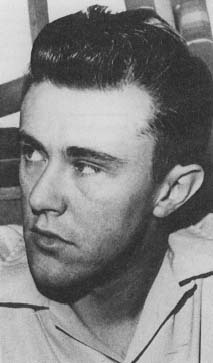Richard Hickock and Perry Smith Trial: 1960
Appeals Fail To Overturn Conviction
Richard Hickock's complaints to the Kansas Bar Association about the fairness of the trial prompted an investigation. The arguable mishandling of the case by the defense lawyers, failure to move the trial venue outside of Finney County, and the acceptance of a juror who had made questionable statements about the suitability of capital punishment in the case opened the way for four appeals and postponements of the death sentence. Court-appointed federal lawyers tried three times to have the Hickock-Smith case heard by the U.S. Supreme Court, but each time the court declined without comment. Hickock and Smith were hanged at the Kansas State Penitentiary on April 14, 1965, five years after their conviction.
 Richard Hickock.
Richard Hickock.
The hangings provided an ending for a book Truman Capote had been working on since the weeks when the Clutter murders were still unsolved. A brief notice of the crime in the New York Times had inspired Capote to choose it as the subject for what he called a "nonfiction novel," a factually correct work written with techniques usually employed in writing fiction.
Capote interviewed everyone connected with the case, from the Clutters' neighbors to Hickock and Smith themselves. After the killers were captured, he followed their trials and became their confidant. When his book, In Cold Blood, appeared at the end of 1965, the lives and deaths of the Clutters and their killers became intimately known to millions of Americans. In Cold Blood was an international best-seller and the basis for a 1967 film.
Capote's experience left him opposed to capital punishment. Instead, he favored the federal imposition of mandatory life sentences for murder. By the time the Supreme Court issued the famous "Miranda Ruling" (see separate entry) in 1966, the writer's celebrity as an authority on criminal matters was such that he was called upon by a U.S. Senate subcommittee examining the court's decision. Capote criticized the high court's opinion that arrested suspects were to be advised of their rights to silence, legal counsel, and the presence of an attorney during police questioning.
Hickock and Smith would have gone "scot-free" under such circumstances because of the lack of clues in the Clutter murders, Capote said. "Any lawyer worth his salt would have advised the boys to say nothing. Had they said nothing, they would not have been brought to trial, much less convicted." Special Agent Alvin Dewey, who had elicited Perry Smith's confession, agreed. Dewey told the subcommittee that investigators abiding by the Miranda rule would be "talking the defendant out of telling us anything."
—Thomas C. Smith
Suggestions for Further Reading
Capote, Truman. In Cold Blood. New York: Random House, 1965.
Clarke, Gerald. Capote: A Biography. New York: Simon & Schuster, 1986.
Marshall, James. Intention—In Law and Society. New York: Funk & Wagnalls, 1968.
Menninger, Karl, M.D. The Crime of Punishment. New York: Viking Press, 1966.
Plimpton, George. "The Story Behind a Nonfiction Novel." New, York Times Book Review (January 16, 1966): 2-3.
Additional topics
- Richard Hickock and Perry Smith Trial: 1960 - Suggestions For Further Reading
- Richard Hickock and Perry Smith Trial: 1960 - Trial Leaves Questions Over Sanity
- Other Free Encyclopedias
Law Library - American Law and Legal InformationNotable Trials and Court Cases - 1954 to 1962Richard Hickock and Perry Smith Trial: 1960 - Trial Leaves Questions Over Sanity, Appeals Fail To Overturn Conviction, Suggestions For Further Reading